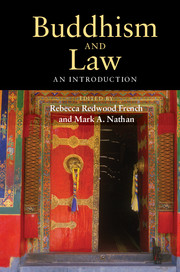Book contents
- Frontmatter
- Dedication
- Contents
- Maps and Illustrations
- Contributors
- Preface
- Abbreviations
- Introducing Buddhism and Law
- Part I The Roots of Buddhism and Law in India
- Part II Buddhism and Law in South and Southeast Asia
- Part III Buddhism and Law in East Asia
- 11 Buddhism and Law in China
- 12 The Ownership and Theft of Monastic Land in Ming China
- 13 Buddhism and Law in China
- 14 Buddhism and Law in Korean History
- 15 Buddhism and Law in Japan
- 16 Relic Theft in Medieval Japan
- Part IV Buddhism and Law in North Asia and the Himalayan Region
- A Selection of Readings
- Index
- References
13 - Buddhism and Law in China
Qing Dynasty to the Present
Published online by Cambridge University Press: 05 August 2014
- Frontmatter
- Dedication
- Contents
- Maps and Illustrations
- Contributors
- Preface
- Abbreviations
- Introducing Buddhism and Law
- Part I The Roots of Buddhism and Law in India
- Part II Buddhism and Law in South and Southeast Asia
- Part III Buddhism and Law in East Asia
- 11 Buddhism and Law in China
- 12 The Ownership and Theft of Monastic Land in Ming China
- 13 Buddhism and Law in China
- 14 Buddhism and Law in Korean History
- 15 Buddhism and Law in Japan
- 16 Relic Theft in Medieval Japan
- Part IV Buddhism and Law in North Asia and the Himalayan Region
- A Selection of Readings
- Index
- References
Summary
Introduction
Law relating to Buddhism in the last period of imperial rule in China embodied much of the legal fabric of earlier periods and, with its unambiguous emphasis on the state control of religion, foreshadowed future legal developments in the Republican and Communist periods. The present chapter surveys the main features of law relating to Buddhism from the Qing Dynasty (1644–1911) through the subsequent era of the Republic of China (1911–49) to the People’s Republic of China (1949 to the present day).
The Qing state sought to contain and control both Buddhism and Daoism through a statutory framework, the Penal Statutes and Sub-statutes of the Great Qing (Da Qing lü, hereafter Qing Code), which was largely inherited from the Ming Dynasty. Adopted in 1646, the Qing made only minor changes to their predecessors’ code and added some sub-statutes. Additionally, a number of administrative decrees and orders were published either in the vast and elaborate Qing Administrative Code or in the departmental rules of the Six Boards, particularly those that were concerned with Buddhism, namely the Boards of Civil Office, Revenue, Rites, and Punishments.
- Type
- Chapter
- Information
- Buddhism and LawAn Introduction, pp. 234 - 254Publisher: Cambridge University PressPrint publication year: 2014
References
- 3
- Cited by



